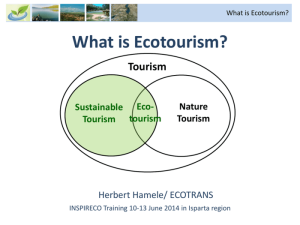
Delving into Sustainable Travel and Ecotourism, this introduction immerses readers in a unique and compelling narrative, with casual formal language style that is both engaging and thought-provoking from the very first sentence.
Sustainable Travel and Ecotourism are pivotal in fostering environmentally conscious travel practices, benefiting local communities, and preserving natural ecosystems. Let’s dive into the principles, initiatives, and accommodations that shape this sustainable approach to exploring the world.
Introduction to Sustainable Travel and Ecotourism
Sustainable travel and ecotourism are forms of responsible tourism that focus on minimizing the negative impact on the environment, while also supporting local communities and preserving natural resources.
It is crucial for the travel industry to adopt sustainable practices to reduce carbon emissions, protect biodiversity, and promote conservation efforts. By choosing eco-friendly accommodations, supporting local businesses, and participating in community-based tourism activities, travelers can contribute to the preservation of fragile ecosystems and cultural heritage.
The Benefits of Ecotourism
- Ecotourism provides economic opportunities for local communities by creating jobs in hospitality, guiding, and conservation efforts.
- By promoting environmental awareness and education, ecotourism encourages visitors to appreciate and protect natural habitats and wildlife.
- Through partnerships with conservation organizations, ecotourism projects contribute to the preservation of endangered species and habitats.
Principles of Sustainable Travel

Sustainable travel involves several key principles that aim to minimize the negative impact on the environment, culture, and economy of the destination being visited. By adhering to these principles, travelers can contribute to the preservation of natural resources and local communities.
Leave No Trace
Leave No Trace
is a fundamental principle of sustainable travel that emphasizes the importance of leaving the environment exactly as you found it. This means refraining from littering, damaging vegetation, or disturbing wildlife during your journey. By practicing Leave No Trace, travelers can help protect the delicate ecosystems of the places they visit.
Reducing Environmental Impact
- Avoid single-use plastics: Bring reusable water bottles, bags, and utensils to minimize plastic waste.
- Use public transportation or walk: Opt for eco-friendly modes of transportation to reduce carbon emissions.
- Support local businesses: Choose accommodations, restaurants, and tour operators that prioritize sustainability and support the local economy.
- Conserve water and energy: Practice water-saving techniques and turn off lights and electronics when not in use.
- Respect wildlife: Observe animals from a safe distance and avoid feeding or touching them to prevent disruption to their natural behavior.
Ecotourism Initiatives
Eco-friendly tourism initiatives play a crucial role in promoting sustainability and preserving natural ecosystems around the world. These initiatives focus on responsible travel practices that minimize negative impacts on the environment while supporting local communities.
Examples of Successful Ecotourism Projects
- The Galapagos Islands Ecotourism Project: This project in Ecuador has implemented strict regulations to protect the unique biodiversity of the Galapagos Islands. Through controlled visitor access and sustainable tourism practices, the project has helped conserve fragile ecosystems and endangered species.
- Bhutan’s Sustainable Tourism Initiative: Bhutan has prioritized sustainable tourism by implementing a daily tourist tariff that includes accommodation, meals, transportation, and a guide. This approach ensures that tourism benefits local communities and contributes to the preservation of Bhutan’s rich cultural and natural heritage.
- The Maasai Mara Ecotourism Project: Located in Kenya, this project involves local Maasai communities in wildlife conservation efforts. By offering eco-friendly accommodations and guided tours led by Maasai guides, the project supports biodiversity conservation and provides sustainable livelihoods for community members.
Contribution of Ecotourism to Biodiversity Conservation
Ecotourism can significantly contribute to biodiversity conservation by raising awareness about the importance of protecting natural habitats and wildlife. Through responsible tourism practices, ecotourism initiatives help reduce habitat destruction, poaching, and pollution in sensitive ecosystems. By supporting local conservation efforts and providing alternative livelihoods for communities, ecotourism plays a vital role in preserving biodiversity for future generations.
Sustainable Accommodation

When it comes to sustainable accommodation, there are key factors that set it apart from traditional options. Sustainable accommodations prioritize environmental and social responsibility throughout their operations, aiming to minimize their ecological footprint and support local communities.
Features of Sustainable Accommodation
- Utilization of renewable energy sources such as solar or wind power.
- Efficient water usage and waste management systems in place.
- Use of environmentally friendly and non-toxic building materials.
- Sourcing local and organic produce for meals.
Comparison with Traditional Accommodations
Eco-friendly accommodations differ from traditional ones by integrating sustainable practices into their daily operations. While traditional accommodations may focus solely on profitability, sustainable accommodations consider the long-term impact on the environment and local communities.
Role of Sustainable Accommodations in Responsible Tourism
- Promote awareness and education on sustainable practices among guests.
- Support local economies by sourcing products and services from nearby businesses.
- Preserve natural habitats and wildlife by implementing conservation initiatives.
- Reduce carbon emissions through energy-efficient practices.
In conclusion, Sustainable Travel and Ecotourism offer a blueprint for responsible travel, emphasizing the importance of minimizing environmental impact and supporting local conservation efforts. By embracing these practices, travelers can make a positive difference while exploring the beauty of our planet.
FAQ Insights
What is the concept of ‘Leave No Trace’ in sustainable travel?
Leave No Trace is a set of outdoor ethics promoting responsible behavior to minimize human impact on natural environments, encouraging travelers to leave landscapes undisturbed.
How can ecotourism contribute to biodiversity conservation?
Ecotourism supports conservation by raising awareness, generating funds for protected areas, and promoting sustainable practices that safeguard diverse ecosystems.





